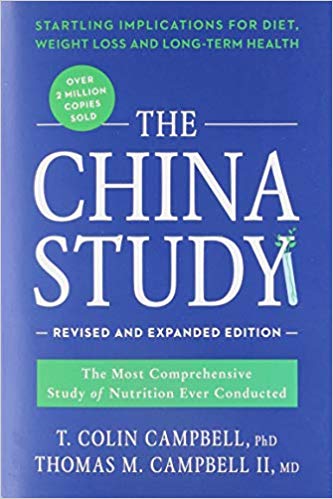T. Colin Campbell grew up on a dairy farm, loved milk, loved meat, and started his career as a nutrition scientist thinking the cornerstone of good nutrition was high-quality animal protein—meat, milk, and eggs.
One of his first projects was for MIT, trying to help the chicken industry. Millions of chickens were dying each year from something toxic in their feed. What was the mystery killer? Campbell was responsible for isolating and determining the structure of the chemical. Through his work, he helped discover dioxin, one of the most toxic chemicals ever found.
After helping with that, he began work helping malnourished children in the Philippines. He wanted to find ways to help them get more protein in their diets, because, again, protein was supposed to be the cornerstone of health. Part of the project was remedying an unusually high incidence of liver cancer in children, which is normally an adult disease. At the time, they thought a lack of protein was leaving the children vulnerable to aflatoxin in their diet.
But as they began their scientific investigation, Campbell discovered the kids who ate the most protein had the highest rates of liver cancer.
But that just couldn’t be right.
And then he came across a study of rats and aflatoxin. The scientists in the study administered the cancer-causing aflatoxin to all of the animals. Half of the animals were then fed a diet with 5% protein. The other half were fed a diet with 20% protein. All of the animals fed a diet with 20% protein developed liver cancer. None of the animals fed a diet with 5% protein developed the cancer.
Again, that couldn’t be right. Protein was good for you. A respected colleague suggested surely the researchers must have mislabeled the animal cages. Campbell decided to run his own studies and find out. Back at Cornell, he and his research assistants ran the experiment multiple times and in various ways. And all of the experiments confirmed that protein promoted cancer growth. In fact, they could turn cancer growth on and off by the amount of protein they fed the animals.
But it wasn’t all protein. It was animal-based protein. The plant-based protein didn’t promote cancer growth.
Campbell was astounded. The findings rocked his world, but he was determined to follow the facts wherever they led. This began decades of research into diet and nutrition. The culmination was what’s called The China Study. It is the most comprehensive study of nutrition ever conducted. And what all of his decades of research demonstrated was that “People who ate the most animal-based foods got the most chronic disease. Even relatively small intakes of animal-based food were associated with adverse effects. People who ate the most plant-based foods were the healthiest and tended to avoid chronic disease.”
Campbell didn’t rest there. He sought out the findings of other researchers and clinicians. And what he found all demonstrates that “The same diet that is good for the prevention of cancer is also good for the prevention of heart disease, as well as obesity, diabetes, cataracts, macular degeneration, Alzheimer’s, cognitive dysfunction, multiple sclerosis, osteoporosis and other diseases.”
What was the diet that showed such important results? A whole food plant-based diet. It’s a diet rich in legumes, whole grains, vegetables, and fruits with little or no meat, milk, and eggs.
Campbell has written a book for lay people like you and me that explains the science and findings called The China Study: Revised and Expanded Edition.

The book is a fascinating masterwork of clarity. In it, he not only explains the research but also how and why various groups have tried to suppress and discredit the information.
Campbell is not some crazy quack. He isn’t someone selling pills and supplement drinks on the internet. He has no financial interest in you believing him. He is one of the foremost researchers on nutrition, a renowned scientist at Cornell University, who has worked as a senior science adviser to the American Institute for Cancer Research, sat on government nutrition panels, and is on the advisory board of the Physicians Committee for Responsible Medicine.
If you or someone you love are worried about any of the following:
- Heart disease
- Cancer (breast, prostate, colon, liver, and others)
- Type 1 Diabetes
- Type 2 Diabetes
- Erectile dysfunction
- Multiple sclerosis
- Cataracts
- Macular degeneration
- Osteoporosis
- Alzheimer’s
I think you will be interested in hearing what he has to report. Of course, you’ll have to make up your own mind about the evidence he provides. But I think you owe it to yourself to hear what he has to say.















Agreed. He’s smart, thorough and intelligent. A real eye opener.
Here’s to wheat berries.